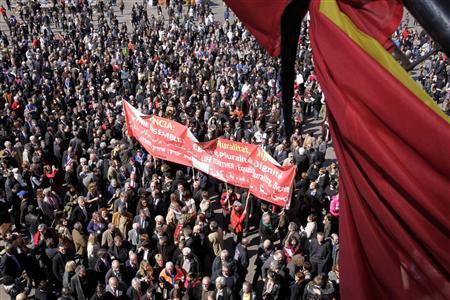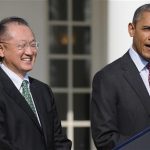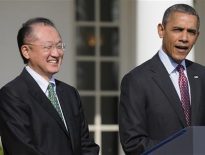By Nicholas Vinocur
TOULOUSE, France (Reuters) – In the aftermath of a killing spree that shocked the nation, France’s Paris-based politicians and national media are deep in debate about its impact on the upcoming presidential election and the need for tighter security.

In the drab Toulouse suburbs where gunman Mohamed Merah killed seven people before being cut down by police commandos, the talk is more of bubbling tensions between ethnic and religious communities and how solutions are nowhere in sight.
The gap is not just between the capital to the north and Toulouse in the southwest. In the gritty outskirts of Paris, within sight of the Eiffel Tower, an “us and them” mentality still haunts the streets rocked by immigrant riots in 2005.
“Politicians in France love to talk about harmony, how there are no communities and everybody lives together,” said Georges Dray, 72, a retired Jewish bar owner who came to Toulouse in the wave of French settlers who left former colony Algeria on its independence in 1962.
“That is pure cinema. They should say how things really are,” he said.
The Toulouse killings claimed the lives of three soldiers, three Jewish children and a rabbi, before gunman Merah died in a shootout with police.
An hour later, conservative President Nicolas Sarkozy, who is campaigning for re-election in the April-May poll, proposed tougher security measures, such as sanctions for people whose frequent viewing of jihadist websites could mean links to radical Islamism.
“This is going to raise questions about our system of integration, our approach to (Islamic) fundamentalism and our tolerance of certain practices here. You’re going to hear a lot about that in the weeks to come,” a senior Sarkozy campaign adviser said, speaking on condition of anonymity.
Lahsen Edbas, 29, a Muslim grocery store worker in the eastern Paris suburb of Le Raincy, echoed a widespread scepticism about the Paris elite: “Why is all this happening now, just before an election?”
TOUGHER CAMPAIGN TO COME
Sarkozy’s re-election campaign has already hammered away at those issues, calling for tighter controls on immigration and tougher access to social benefits for foreigners settling here.
Muslim and Jews here, many of them born in France and well integrated, saw these as code words and terms aimed against them. There are about 5 million Muslims and 600,000 Jews in the 63 million population of metropolitan France.
When Prime Minister Francois Fillon suggested in early March that Muslims and Jews should give up the “ancestral traditions” of halal and kosher meat, leaders of those minorities said they were being stigmatised so Sarkozy could win far-right votes.
Debates like that over halal and kosher slaughter practices or the killings in Toulouse – where there were both Muslim and Jewish victims – have brought national leaders of the two communities closer together.
But the gap between majority and minority, and between Jew and Muslim, seems to be growing at the grassroots level.
Mohamed, a Toulouse construction worker in his 30s, noted Merah reportedly turned to radicalism after being rejected twice by the army. “You think that’s only because of the dumb things he did as a kid?” he asked. “Your name and the colour of your skin also count.”
Mohamed said divisions in French society were widening. “There are also big tensions between the communities,” he said, referring to Muslims and Jews. “This sort of event, given how it’s distorted in the media, will make that worse.”
MUSLIM-JEWISH STRAINS
Dray said Jews had encountered prejudice in the past from French anti-Semites but now suffered it mostly “from the Islamists” and said it had got worse over the years.
“They talk about being brothers, but they are only brothers among themselves and full of hatred for Jews and everyone else.”
Roger, a 50-year-old supporter of the anti-immigrant National Front, said violence, crime and the number of mosques had all been on the rise for years in Toulouse.
“In France, we keep a lid on things,” he said. “But I’ll tell you one thing; France is at a boiling point, and some day, it’s going to explode.”
Amairi Messaoud, 55, a Tunisian-born fast-food restaurant manager in Le Raincy, had more confidence in his non-Muslim neighbours: “I don’t think it will affect relations, not in France, because the French know what Islam is really about.”
Analysts pondering the effect of the killings on French society did not expect copy-cat attacks.
Roland Jacquard, head of the International Terrorism Observatory, told Reuters Television that very few young Frenchmen had gone for training in Pakistan and Afghanistan.
“There may remain about 10 of them in France,” he said.
Antoine Basbous, a terrorism expert at the Observatory of Arab Countries, also stressed the apparent “lone wolf” nature of Merah’s attack. “Right now this does not represent a threat to social peace,” he said.
But Basbous said France still had a problem with its minorities. “A country that no longer can integrate its immigrants and treat them correctly is a problem,” he said.
(Reporting by Nicholas Vinocur in Toulouse, Vicky Buffery in Le Raincy, Catherine Bremer and Tom Heneghan in Paris; Writing by Tom Heneghan; Editing by Will Waterman)



